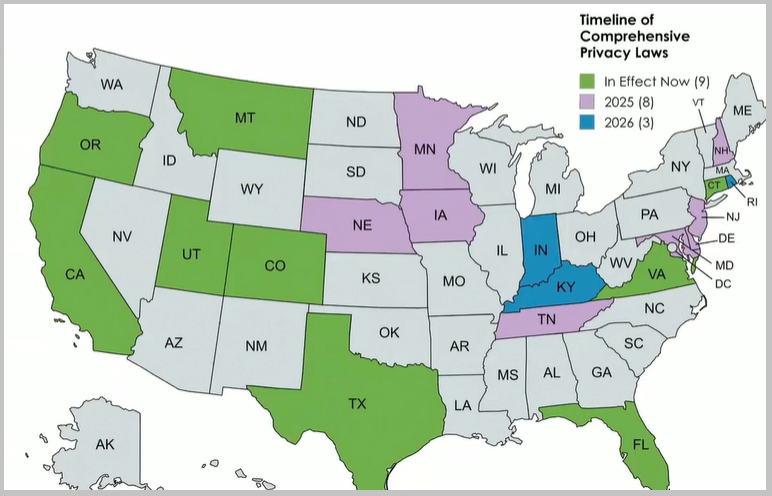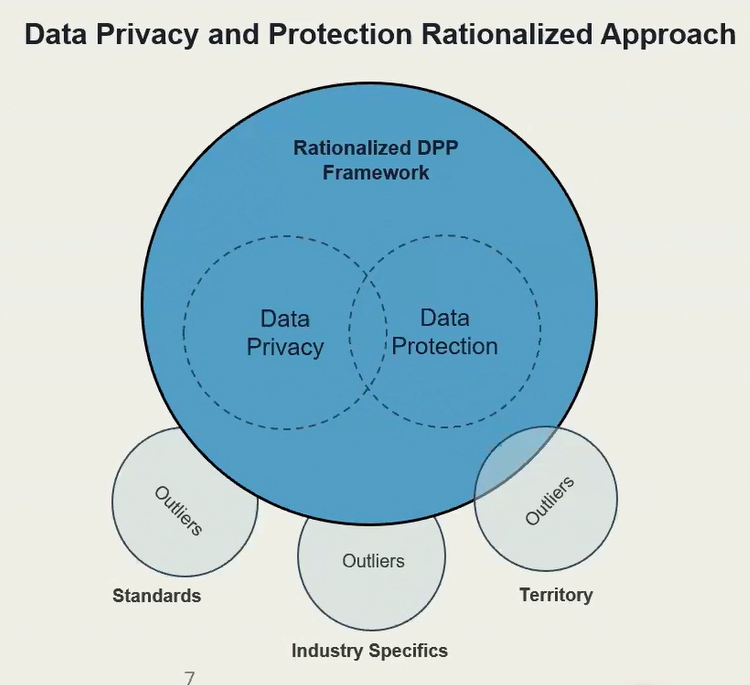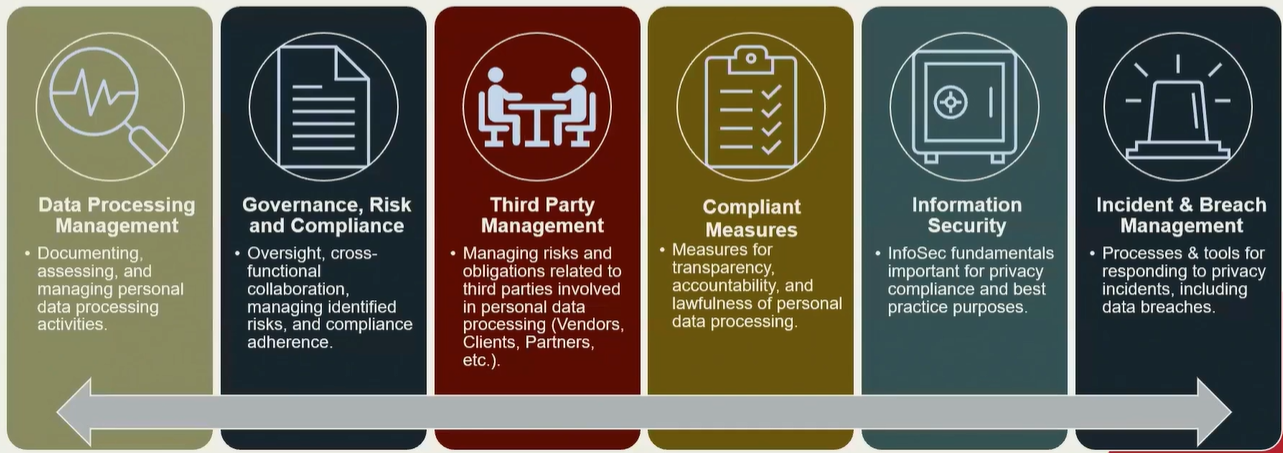Why Companies Need to Manage and Mitigate Data Privacy Risks
12/13/2024If your company deals with personal data, managing data privacy risks is crucial to your livelihood. With the explosion of personal data collection and usage and the rapidly evolving regulatory landscape, companies face heightened compliance expectations, increased operational risks, and greater scrutiny from regulators and consumers alike. Without a clear, protective strategy, you risk reputational damage, legal penalties, and loss of customer trust.
To help companies navigate this complex discipline, we’ve created this short guide on data privacy risk management. We’ll look at the dynamic nature of privacy regulations and best practices for achieving compliance and mitigating risk. We’ll also touch on PCG’s approach to data privacy and why Fortune 1000 and mid-market companies choose us as their data privacy partner.


The Proliferation of Global Data Privacy Regulations
Privacy regulations are rapidly evolving around the globe. Frameworks like the General Data Protection Regulation (GDPR) in the EU and UK revolutionized the privacy regulatory landscape, but they are not alone. Since GDPR came into effect in 2018, countries all around the world have followed suit implementing similar laws, including from major economies like China, India, Japan, Brazil and more. At last count, more than 75% of countries have some form of privacy laws.
On domestic shores, the United States has seen a patchwork of state-specific comprehensive privacy laws emerge, such as the California Consumer Privacy Act (CCPA) and the Virginia Consumer Data Protection Act (VCDPA). Historically in the US many privacy laws focused on specific industries or functions. For example, Health Care (HIPAA), Financial Institutions (GLBA), and Children’s data (COPPA). These new laws are significant because they are generally industry agnostic, which means they impact many US companies that previously may not have been subject to robust privacy laws.
This has led to a complex compliance landscape for multinational and interstate companies. Even if your company is not located in one of these states, you may be required to comply with their privacy laws if your customers, employees or other data subjects reside there. As more and more states adopt similar regulations, compliance becomes increasingly convoluted. By early 2026, at least 20 US States will have comprehensive privacy laws in place, affecting many companies that operate or serve customers nationally. Until a national privacy law comes to fruition, companies are left to forge their own national strategies.
Not only are more laws coming into play, but enforcement has also become more aggressive. Fines imposed on major companies in the amount of tens and hundreds of millions of dollars, even $1B+, have captured headlines, but it’s important to recognize that enforcement threatens small and mid-market companies as well. Understanding and navigating laws beyond home borders is essential to ensuring compliance, avoiding penalties, and maintaining a competitive edge in the global market.
The Three Pillars of Data Privacy Risk Management
At PCG, we focus on three critical areas to strengthen your company’s data privacy program:
1.Data Subjects
Protecting the rights of individuals whose personal data is collected. This involves processing and using data ethically to minimize the risks of breach or misuse.
2.Legal and Compliance
Adherence to applicable privacy laws and regulations. This requires vigilance to stay up-to-date on current regulations and trends.
3.Business Reputation
Mitigating risks to your brand by building trust with customers and partners. As customers and clients become more concerned with how their data is handled, companies must provide robust protections. Data privacy measures are no longer a luxury but a prerequisite for remaining competitive.
How to Address Data Privacy Challenges
We’ve streamlined the engagements needed to implement proper data privacy compliance measures into three key steps:
1. Assess Compliance Gaps and Risks
Evaluate your current practices against global regulations. This includes pinpointing gaps and identifying opportunities..
2. Recommend and Implement Solutions
Using a tailored approach, we design practical strategies to close gaps and enhance your data privacy compliance posture . Our team works alongside yours to design and implement these measures in a way that integrates with your existing operational structure.
3. Designate a Data Protection Officer (DPO)
We provide dedicated professionals for companies with and without internal expertise to support ongoing compliance and governance efforts through privacy program management assistance.
4 Elements of PCG’s Data Privacy Solutions
Effective privacy risk management requires a multi-prong approach. At PCG, we bring unmatched expertise and tools to your data privacy efforts:
1. Deep Experience and Subject Matter Experts (SMEs)
When dealing with the ambiguity of emerging or shifting compliance standards, you need a pragmatic approach grounded in past success. Our team includes industry leaders in data privacy and regulatory compliance. We’ve navigated these challenges in many industries.
2. Customizable Frameworks and Methodology
One size does not fit all. Your company has unique and specific operational and compliance needs. We’ve developed defined frameworks that are adaptable to your situation.
3. Proprietary Tools and Templates
Leveraging tools and capabilities developed over time enables us to be efficient and accelerate timelines for our clients. We’ve developed our own proprietary software system called Prividia for privacy program management purposes to reduce reliance on cumbersome spreadsheets. Additionally, we’ve developed a wide array of materials to educate and inform our clients on topics, procedures and policies as they pertain to them.
4. Collaborative Approach
Perhaps most importantly, we integrate seamlessly with your team and existing processes. We partner closely with clients to identify the right fit solutions, understanding that no two companies are the same.


The Benefits of a Rationalized Approach to Privacy Compliance
Rather than addressing each regulation individually, we implement a rationalized framework of policies, procedures and other solutions derived from GDPR and other robust privacy law requirements. This approach is more efficient, cost-effective, and scalable. It fully addresses major frameworks like GDPR and offers ~90% risk reduction against similar laws. For any remaining “outlier” regulations the company may be subject to, we provide targeted solutions where applicable.
The Rationalized Approach
The Rationalized Approach consists of policies, procedures, and other competencies related to the following categories:
- Data Processing Management: Defining the types of data collected, how it is used, understanding where it resides, and conducting risk assessments.
- Governance and Compliance: Maintaining effective oversight and governance surrounding personal data processing activities.
- Third-Party Management: Ensuring your vendors meet privacy requirements and you are prepared to respond to inquiries from your clients, where applicable.
- Compliant Measures: Ensuring transparency and accountability of data processing.
- Information Security: Safeguarding data against breaches.
- Incident and Breach Management: Rapidly identifying, addressing , and reporting data breaches.

Why Your Company Needs Data Privacy Expertise
Many companies already have security programs or measures in place but lack the privacy expertise to align these practices with applicable regulations. Privacy compliance requires experienced professionals who can connect the dots between operational practices and legal requirements while developing new solutions to close gaps.
The more sensitive data your company collects and processes, the higher the compliance expectations you must meet. While Security and IT teams excel in cybersecurity, they often lack the familiarity needed around uniquely privacy issues. Not leveraging this level of expertise puts your business at increasing risk.


Secure Your Business with a Strong Data Privacy Posture
Don’t leave your company exposed to unnecessary privacy risks. A strong privacy compliance posture not only reduces risks but also builds trust with customers, clients, partners, and employees, giving your company a competitive advantage.
PCG’s experienced professionals and low-ego approach make working with us easy and productive. Contact us today to learn how we can protect your business with a rationalized approach to privacy and data protection management.
